
Pushpamala N. and Mamta G. Sagar. Motherland. First live performance at Samuha Artist's Collective, Bangalore. 30 minutes. 2010. Photograph by Clay Kelton. Image courtesy of Pushpamala N.
THIS ESSAY IS TAKEN FROM THE PERFORMANCE ART ISSUE OF ART INDIA VOLUME XV, ISSUE IV, 2010-11.
In a talk at the Tate Modern, London, art historian Rose Lee Goldberg remarked that if Conceptual Art was the dematerialization of the art object, then Live Performance was the materialization of the art concept. Although 'live art' has a deep history in the West - performances by the Dadaists, the Russian Futurists and contemporary artists like Marina Abramovic, who had a huge show recently at the Museum of Modern Art, New York, are well known this mode of framing 'actual' experience has been slow to gain a foothold in India. Aspects of performances which involve the use of their bodies have been explored by several Indian artists in photographic and video-based works. Performances before a live audience are a recent development though. In the lens-based works, the still or video camera documents the performance of the artist and works as a substitute for a live audience.
The Khoj International Artists' Workshop at Modinagar, New Delhi, has been instrumental in giving a fillip to performance art in India. Unlike private galleries averse to hosting a performance, Khoj offered artists space where they could push the boundaries of their visual vocabularies. Recall the performance in 1999 by Subodh Gupta where he smeared his body with cow dung and mud and lay on a ground, pockmarked with hollows holding embedded objects, or Pushpamala N's Sunehre Sapne (1998), where one saw her in a golden dress and bouffant hairstyle. One also remembers seeing Sonia Khurana in Flower Carrier - 1 and 3 (2006), walking determinedly, holding a plastic flower in front of her.
Esta historia es de la edición March 2022 de Art India.
Comience su prueba gratuita de Magzter GOLD de 7 días para acceder a miles de historias premium seleccionadas y a más de 9,000 revistas y periódicos.
Ya eres suscriptor ? Conectar
Esta historia es de la edición March 2022 de Art India.
Comience su prueba gratuita de Magzter GOLD de 7 días para acceder a miles de historias premium seleccionadas y a más de 9,000 revistas y periódicos.
Ya eres suscriptor? Conectar

Parts, Wholes And The Spaces In Between
Sonal Sundararajan introduces Samira Rathod's free-spirited and rebellious explorations in the world of architecture, furniture and design.

"The Fine Art of Going to the Pictures."
Dr. Banerjee in Dr. Kulkarni's Nursing Home at Chemould Prescott Road brings together 26 paintings featuring a series of dramatic scenes from Hindi and Bengali films. In conversation with Abhay Sardesai, artist Atul Dodiya talks about childhood trips to movie halls, painted figures gripped by tension, and the closeness and remoteness of cinematic images.
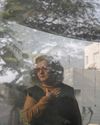
"To Finally Have Something of Your Own to Mine."
Dayanita Singh is the recipient of the coveted 2022 Hasselblad Award. Keeping the photograph at the centre, she speaks to Shreevatsa Nevatia about books, book objects, photo novels, exhibitions and museums.

OF DIVINE LOSS
Shaurya Kumar explores the relationship between the subject and object of devotion, finds Aranya.
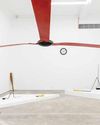
THE PAST AND ITS SHADOWS
Neha Mitra visits two shows and three artists in Mumbai.
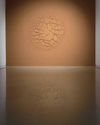
FORCE OF NATURE
Alwar Balasubramaniam dwells on absences and ephemeralities in his new work, states Meera Menezes.
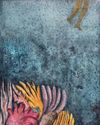
SHAPES OF WATER
Devika Sundar's works delineate the murky, malleable boundaries between the human body and the organic world, says Joshua Muyiwa.

INTIMATIONS OF INTIMACY
Sunil Gupta shares his journey with Gautami Reddy.
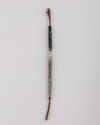
THE FRACTURED PROSPECT
Nocturnal landscapes as ruins in the making? Adwait Singh looks at Biraaj Dodiya's scenes of loss.
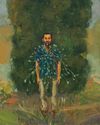
TEETERING BEYOND OUR GRASP
Meera Menezes traces Mahesh Baliga's journey from Moodabidri to London.